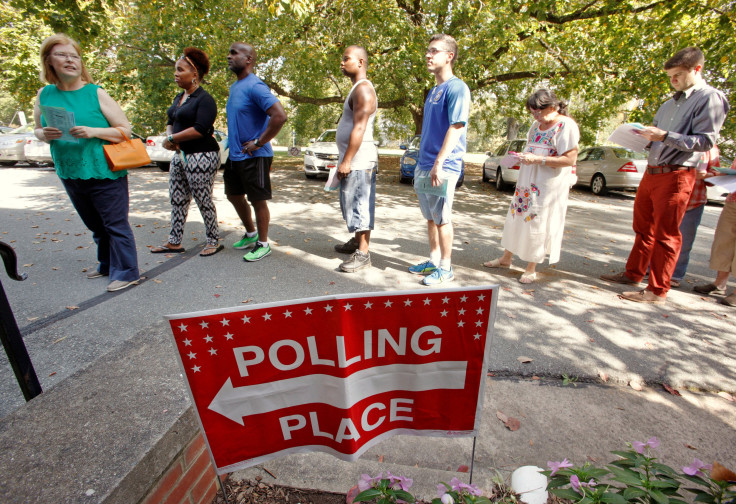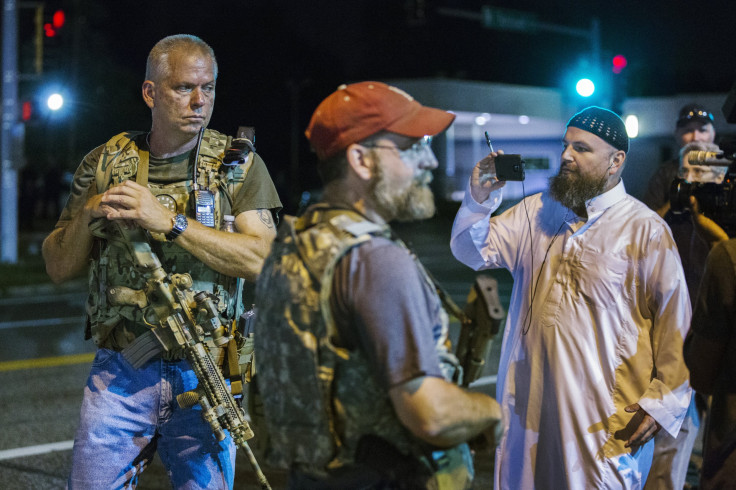Who Are The Oath Keepers? Meet The Militia Group That Plans To Watch Polling Stations On Election Day

Stewart Rhodes is certain that the 2016 election is being manipulated by "competing cartels" of power-hungry politicians — and that it's his job to stop it. A Yale Law graduate and the founder of the anti-government group the Oath Keepers, Rhodes traces election rigging back to accusations that John F. Kennedy used dead peoples' votes to steal the presidency from Richard Nixon in 1960. He's determined not to let that happen this year.
"We're looking for ways to maximize our ability to make the bad guys worry about being discovered," he said in a phone interview this week. "And that's the best thing we could do to throw a monkey wrench in their plans and hopefully chill their criminal activity."
Rhodes has engineered a controversial call-to-action for his group — labeled as extremist by the Southern Poverty Law Center and best-known for showing up armed with rifles during the 2014 protests in Ferguson, Mississippi — to secretly monitor polling stations dressed in undercover garb such as "a Bob Marley, pot leaf, tie-die peace symbol." Despite studies showing very few proven cases of successful voter fraud, for Rhodes the question is not if there will be fraud, but how vast that fraud will be.
He's not alone. Talk of an unfair election has been a central issue during the 2016 election. The left has railed against restrictive voter registration laws it says suppresses young people and minorities from exercising their right to vote. The right, meanwhile, has issued warnings of massive voter fraud, including myriad complaints of a rigged election from Republican presidential nominee Donald Trump. Fringe groups have suggested they'll work to intimidate voters.
The accusations have fueled distrust of the system and prompted a flood of activity as voters head to the polls. While charging that the election is rigged against him, Trump has told his supporters in Colorado to vote multiple times because he didn't trust that mailed-in ballots would be handled properly. The GOP nominee called for his supporters to monitor "certain areas" to look out for misdeeds by supporters of Democratic nominee Hillary Clinton. Neo-Nazis, meanwhile, have a plan to attempt to suppress black votes in Philadelphia, according to a Politico report, while an anonymous senior Trump official told Bloomberg the campaign had "three major voter suppression operations" underway, aimed at "idealistic white liberals, young women and African Americans."
On the other side, the North Carolina NAACP last month filed a lawsuit claiming many African-American voters were improperly purged from the voter roll. Advocates also launched court cases against laws requiring photo ID at polling-places in states like Texas and Wisconsin, noting the rules disproportionately affect minority communities.
While the Oath Keepers see themselves as a solution to preventing voter intimidation and suppression, others see it differently. The Lawyers' Committee for Civil Rights Under Law, a civil rights group, said in a statement there was "no place in our democracy for this form of vigilantism and extremism" while the Anti-Defamation League told the Washington Post there was "potential for intimidation" and "angry backlash" from people who feel unfairly targeted by the group.
Rhodes' proposed plans include surreptitiously looking for the so-called bad guys and tracking license plate numbers to see if vehicles are traveling from polling station to polling station to register multiple voters. Rhodes gets angered by the suggestion that his militia group, composed largely of former law enforcement officers and military members, is set to confront or intimidate voters.
"We're not trying to chill anyone’s legitimate vote," Rhodes said. "Whether the leftist press wants to believe it or not, I would report some asshole on the so-called right who was doing that, just like I would report someone on the left."
Rhodes didn't specify how he and his followers would search for people abusing the voting system, only that they'd look for irregularities and track vehicles of voters to see if they went from polling station to polling station. Asked if that type of surveillance could cross into intimidation, Rhodes said how could it be intimidation if nobody knew they were there. Just "don’t be a crook," he said.
Formed around the time President Barack Obama took office, Rhodes' Oath Keepers grew rapidly under his administration amid the rise of the "birther" and "tea party" movements. They're a so-called "patriot group" who vow as current or former military members or law enforcement officials never to disarm Americans, detain citizens, force people into detention camps or aid foreign troops "keeping the peace" on U.S. soil. The group claims some 30,000 members, although that figure is up for debate.
A now middle-aged Rhodes lives in a small Montana town, running the group and planning actions like the polling station operation. He grew up in the Southwest, joined the Army as a paratrooper after high school and received an honorable discharge after an injury during a night parachuting accident. Many of Rhodes' fears today stem from the Sept. 11 2001 terrorist attacks and the Patriot Act, which allowed massive government surveillance of citizens. The law came into effect right about the time Rhodes attended Yale Law School, where his paper "Solving the Puzzle of Enemy Combatant Status" won a prize for being the best writing about the Bill of Rights. He'd go on to work for Ron Paul's 2008 presidential campaign. After Paul's bid failed, Rhodes withdrew from mainstream politics and formed the Oath Keepers. Their mission: to defend the Constitution and arm themselves against any politician who attempted to abuse his or her power to stifle Americans' freedoms.

Rhodes first gained notoriety in 2008 by writing a column that urged readers to imagine a dystopian United States where "Herr Hitlery" — Clinton — won the presidential election, which would lead to a "conveniently timed 'domestic terrorism' incident," a ban on firearms and the persecution of the militia movement. Obviously he's no fan of the former secretary of state, but he's also not particularly fond of Trump, whom he called a "reality show guy," who doesn't seem to understand the Constitution. Rhodes didn't say who he was voting for, but did say Trump could be a wrecking ball of sorts for corrupt politicians.
What pushed Rhodes to take action during the 2016 campaign was a video from Project Veritas, a conservative group that has carried out a number of undercover stings, including the one that brought down the community organizing group ACORN. The new Project Veritas video purported to show a Democratic operative saying they could ship in liberal voters from out of state to swing election results. The head of Project Veritas has a history of selectively editing sting videos to further conservative agendas, but two of the Democratic staffers in the video did step down after its release in mid-October.
To Rhodes, Project Veritas put on display what he already believed to be true: People in power do everything they can to increase their stature, which means rigging votes. That includes elites on both the left and the right.
Outside of his disagreement with socialism, Rhodes said, some of his ideas actually skirt close to the Occupy Wall Street folks who fought against the wealthy and privileged One Percent. But the Oath Keepers are also concerned about a New World Order, or the idea that the government will disarm the population and, in turn, usher in a one-world-government aimed at the best interests of so-called globalist elites.
"So, basically inside the beltway, inside New York City, the ruling class versus the rest of us, that’s really the bottom line," Rhodes said. "They see us as useful, dumb animals and cannon fodder for their friggin ' wars. They see us as you know … expendable robots, worker bees or voter bees for their own benefit."
The government is too powerful, Rhodes said, referring to a drone strike in 2011 that killed a 16-year-old boy whose father had joined al-Qaeda, while the boy had not. That story angered many Americans on both sides of the aisle, but to Rhodes, most people are still missing the bigger picture: that we've essentially allowed the government the power to do whatever it wants, at home and abroad.
"It's like I'm in some friggin' Orwellian nightmare, where I look around and go, 'Don’t you see this?'" he said.
© Copyright IBTimes 2025. All rights reserved.






















